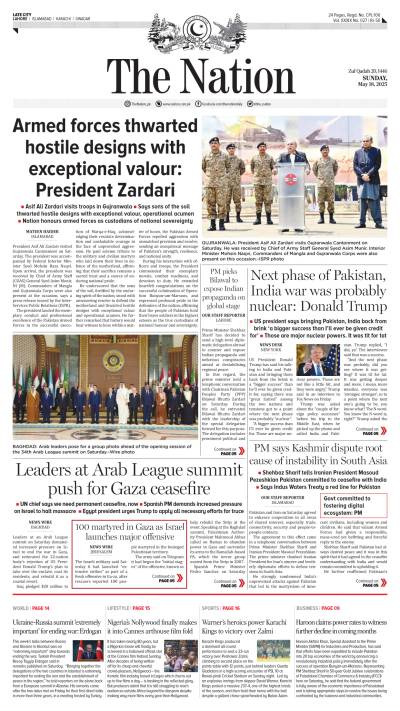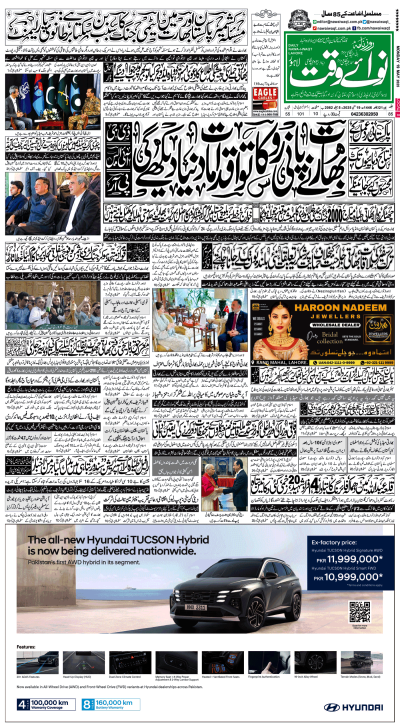Islamabad - Pakistan yesterday resolved to maintain Full Spectrum Deterrence in line with the policy of Credible Minimum Deterrence terming it is a key factor of stability in South Asia.
The resolve was made at the 22nd Meeting of National Command Authority (NCA), which met with Prime Minister Nawaz Sharif in the chair in Rawalpindi on Wednesday. The Authority has also reiterated its determination to make national security robust enabling it to effectively respond to all kind of threats without indulging in arms race.
According to ISPR, the meeting undertook a comprehensive review of the prevailing regional and international security environment.
It took note of the growing conventional and strategic weapons’ development in the region, and expressed serious concerns over the adverse ramifications for peace and security on this account.
National Command Authority expressed satisfaction on the measures in-place to ensure highly effective security of strategic assets and installations.
The meeting noted with satisfaction that Pakistan has the requisite credentials that entitle it to become part of all multilateral export control regimes, including the Nuclear Suppliers Group (NSG), for which Pakistan seeks adoption of a non-discriminatory approach. It reposed full confidence in the reliable command and control system of the national strategic capability and appreciated the high standard of operational preparedness of the strategic forces. It re-emphasised Pakistan’s desire for establishing the Strategic Restraint Regime in South Asia.
The meeting also ratified the Convention on Physical Protection of Nuclear Material (Amended). The meeting was attended by the ministers of defence, finance and interior, adviser and special assistant to PM on foreign affairs, chairman joint chiefs of staff committee, services chiefs, director general of Strategic Plans Division and other senior officials. The development comes after Pakistan unveiled plans to stoutly contest for the membership of Nuclear Suppliers Group (NSG) during the forthcoming Nuclear Security Summit to be held in Washington next month.
The prime minister will participate in the Summit and will meet important leaders on the margin of the Summit to rally support for Pakistan’s efforts to join the NSG.
Foreign Secretary Aizaz Ahmad Chaudhry recently told a seminar in Islamabad that Pakistan wants a criteria-based treatment following the US-India civil nuclear deal which he believed has upset the strategic balance in South Asia. “We will not accept discrimination anymore,” he said in response to a question.
According to experts and analysts, Pakistan deserves equal treatment to benefit from its peaceful nuclear programme in civil domain including its efforts to tap nuclear energy to meet its national needs. The United States which signed the landmark civil nuclear deal with India few years ago has been reluctant to treat Pakistan at par with India, the two nuclear armed neighbours that had fought three wars.
Some experts feared that discriminatory approach towards Pakistan would eventually lead to arms race in the region which will not be good for the region as well as international security system. Islamabad has been raising its concerns over India’s rapidly expanding conventional military asymmetry and dangerous limited conventional war policy called Cold Start doctrine. Pakistan developed its nuclear programme as part of its defence strategy after India conducted its nuclear test in 1972, while Pakistan conducted its nuclear test in late 90s in a bid to acquire a minimum nuclear deterrence in the face of threats from India.
Monday, May 19, 2025
NCA concerned over arms buildup in region
-
Lahore emerges among safest global cities in Numbeo 2025 index
-
Lahore emerges among safest global cities in Numbeo 2025 index
-
India’s suspension of Indus Water Treaty legally baseless
-
Seventh polio case reported in Pakistan amid nationwide vaccination drive
-
Pakistan reports sixth polio case of 2025
-
PTA begins issuing VPN licences to regulate usage
Culture Shift
May 18, 2025
Tactical Shift
May 18, 2025
Unmasked Cruelty
May 18, 2025
India Isolated
May 17, 2025
Descent into Hell
May 17, 2025
Pakistan’s Strategic Edge
May 19, 2025
Lessons for India
May 19, 2025
Galiyat’s Poor Network Services
May 19, 2025
A City in Neglect
May 19, 2025
Rising Cost of Living
May 19, 2025
ePaper - Nawaiwaqt
Nawaiwaqt Group | Copyright © 2025





